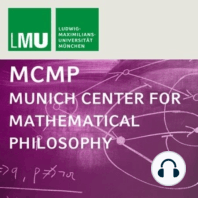54 min listen

Learning Experiences, Expected Inaccuracy, and the Value of Knowledge
Learning Experiences, Expected Inaccuracy, and the Value of Knowledge
ratings:
Length:
57 minutes
Released:
Apr 18, 2019
Format:
Podcast episode
Description
Simon Huttegger (UC Irvine) gives a talk at the MCMP Colloquium (8 May, 2014) titled "Learning Experiences, Expected Inaccuracy, and the Value of Knowledge". Abstract: I argue that van Fraassen's reflection principle is a principle of rational learning. First, I show that it follows if one wants to minimize expected inaccuracy. Second, the reflection principle is a consequence of a postulate describing genuine learning situations, which is related to the value of knowledge theorem in decision theory. Roughly speaking, this postulate says that a genuine learning experience cannot lead one to foreseeably make worse decisions after the learning experience than one could already have made before learning.
Released:
Apr 18, 2019
Format:
Podcast episode
Titles in the series (22)
Haecceities and Mathematical Structuralism: Colloquium Mathematical Philosophy by MCMP – Philosophy of Mathematics